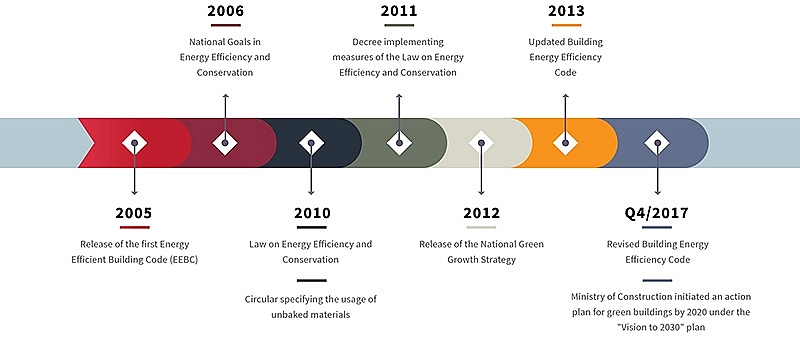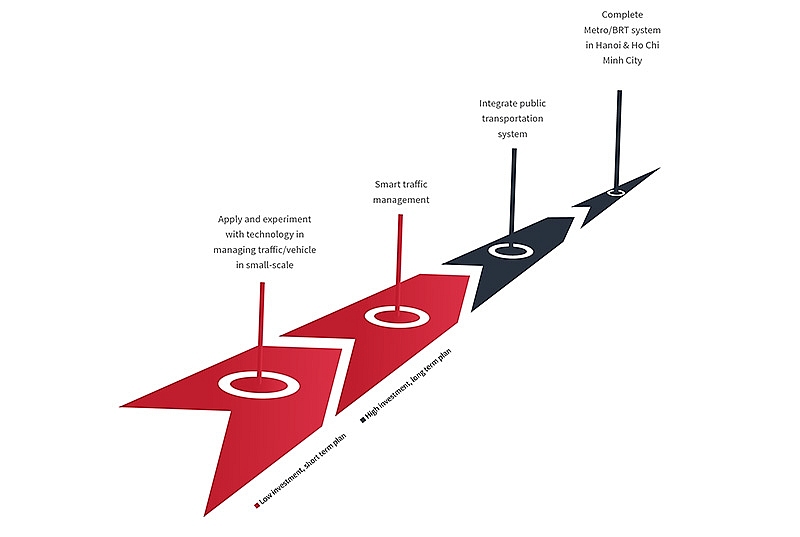Sustainable urbanisation a vital goal
 |
| Vietnam’s green building initiatives to promote green growth, Source: Solidiance research and analysis |
 |
| Action plan to reduce traffic congestion in Vietnamese cities, Source: Solidiance research and analysis |
Sustainable development key to urbanisation
Though there is no consensus on a single model for the development of a sustainable city, there are numerous remedies that can potentially aid and support long-term environmental and ecological stability. The public and private sectors are currently working, simultaneously and co-operatively, towards developing sustainable cities in the two largest urban areas of Vietnam: Ho Chi Minh City and Hanoi. According to Solidiance’s white paper, there are four fundamental features that are critical to the development of sustainable cities:
lPublic transportation. In an effort to reduce road congestion, the Vietnamese government is currently in the process of building dedicated urban railway networks in both Ho Chi Minh City and Hanoi. The first two lines of the metro system of Ho Chi Minh City are expected to begin operation in the last quarter of 2020, while Hanoi is aiming to develop up to eight urban rail projects in the near future. There are expansion and development plans for existing public transportation, such as the public bus system, and the prevalence of ride-sharing applications globally has greatly influenced the current choices for transport for people in all the major cities of Vietnam.
lGreen spaces. Rapid urban development in Vietnam has left major cities in Vietnam relatively void of available green space to give respite to denizens from air, noise, and visual pollution associated with densely populated urban areas. Land reclamation and projects protecting existing forested areas are underway in Ho Chi Minh City, such as the development of Thu Thiem Peninsula in District 2, where two separate 14-hectare lakes, each with a diameter of 350 metres, will be developed. Policies have been applied that oblige all large private residential and commercial developments to set aside publicly accessible green space. Hanoi, on the other hand, intends to increase the number of trees and water features. By 2025, the capital plans to have 60 parks, including 18 new and 42 upgraded or renovated parks and gardens.
lGreen buildings. Green building initiatives are in development, supported by the government in order to manage limited resources and usage in densely populated areas. Vietnamese developers are beginning to more commonly use internationally established environmental and efficiency standards on new buildings and projects in order to make their developments more attractive to an international audience as well as hedging on long-term cost savings from reduced and more efficient resource usage. At the end of 2017, there were over 60 internationally certified green building projects in Vietnam, with an additional 50 projects currently in development. Moreover, the concept of smart homes and the application of smart technology is gaining some popularity, particularly in newer developments in Ho Chi Minh City and Hanoi. It is expected that through 2022, smart home technology will grow at a staggering rate of 63 per cent, driven heavily by luxury developments.
lSmart cities. Currently, 33 centrally governed cities and provinces in Vietnam have begun implementing smart city initiatives in order to facilitate easier city management and to improve the overall quality of life in denser urban areas. Ho Chi Minh City plans to become the first smart city in Vietnam by 2020 and is the home to Thu Thiem Eco-Smart City, which is currently in development: a 7.4ha project with plans to develop a trading and finance centre, hotel space, office towers, and a full-serviced residential building. A number of other public, private, and public-private partnership (PPP) projects are in development in the rapidly developing outer districts of Ho Chi Minh City, particularly districts 2, 7, 9, 12, and Thu Duc. Hanoi envisions smart city development by 2030. The implementation of smart city infrastructure in the rural suburban district of Dong Anh, in a $4 billion joint venture of BRG Group of Vietnam and Sumitomo Corporation of Japan, will begin in October 2018. Microsoft, the American Chamber of Commerce, the International Finance Corporation (IFC), and the city governments of Ho Chi Minh City and Hanoi have also begun collaborating to develop new projects.
Opportunity for companies to support sustainable urbanisation efforts
Through different frameworks for PPP ventures, the Vietnamese government has invited the private sector to invest in large-scale transportation projects to acquire the large amounts of capital needed to complete them. In Ho Chi Minh City alone, there were over 130 investors who showed interest in investing in PPP projects with an estimated total value of $17 billion in investments as of October 2017.
The Vietnamese government has previously opened tendering and bidding periods for both local and international companies to invest in large infrastructure projects in Vietnam, with numerous advantages to being a partner in such ventures.
An example of a current PPP project is the partnership between Hanoi and FPT Group, the largest IT service and telecommunications company in Vietnam, to build its intelligent transportation system to manage and regulate traffic. Ho Chi Minh City, as the economic and business centre of the country, and Hanoi, as the political capital of the country, will serve as the leaders and models for the future sustainable development of cities in Vietnam and potentially all of Southeast Asia.
Ho Chi Minh City and Hanoi will need to establish more smart city initiatives to minimise the impact of severe traffic congestion as seen in other large Asian cities, such as a reduction in quality of life from negative public health impacts and hindrance of economic growth from lost time.
The business community can help here by advising policymakers on the most appropriate model and also consult, where possible, on the best practices and potential improvements to sustainability. Large amounts of capital are needed to sustainably develop the cities of Vietnam. The estimated budget for developing Hanoi alone to become a smart city is around $3 billion. The city will provide approximately $350 million from the national and city budgets, with the remainder to be raised from private investors or the implementation of certain PPP projects.
By Dennis Lien Manager, Solidiance Vietnam
What the stars mean:
★ Poor ★ ★ Promising ★★★ Good ★★★★ Very good ★★★★★ Exceptional
 Tag:
Tag:
Related Contents
Latest News
More News
- NAB Innovation Centre underscores Vietnam’s appeal for tech investment (January 30, 2026 | 11:16)
- Vietnam moves towards market-based fuel management with E10 rollout (January 30, 2026 | 11:10)
- Vietnam startup funding enters a period of capital reset (January 30, 2026 | 11:06)
- Vietnam strengthens public debt management with World Bank and IMF (January 30, 2026 | 11:00)
- PM inspects APEC 2027 project progress in An Giang province (January 29, 2026 | 09:00)
- Vietnam among the world’s top 15 trading nations (January 28, 2026 | 17:12)
- Vietnam accelerates preparations for arbitration centre linked to new financial hub (January 28, 2026 | 17:09)
- Vietnam's IPO market on recovery trajectory (January 28, 2026 | 17:04)
- Digital economy takes centre stage in Vietnam’s new growth model (January 28, 2026 | 11:43)
- EU Council president to visit Vietnam amid partnership upgrade (January 28, 2026 | 11:00)






















 Mobile Version
Mobile Version